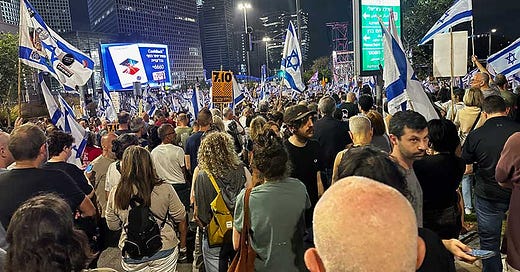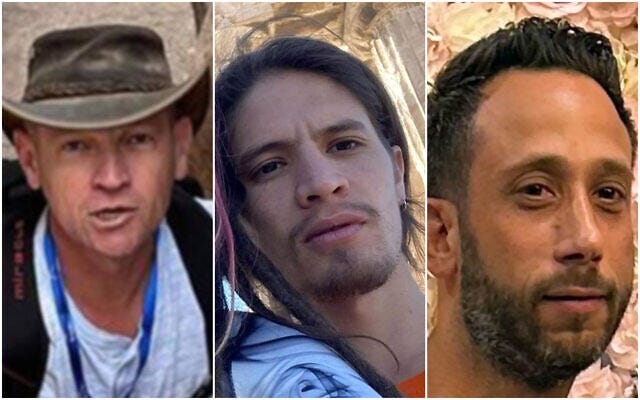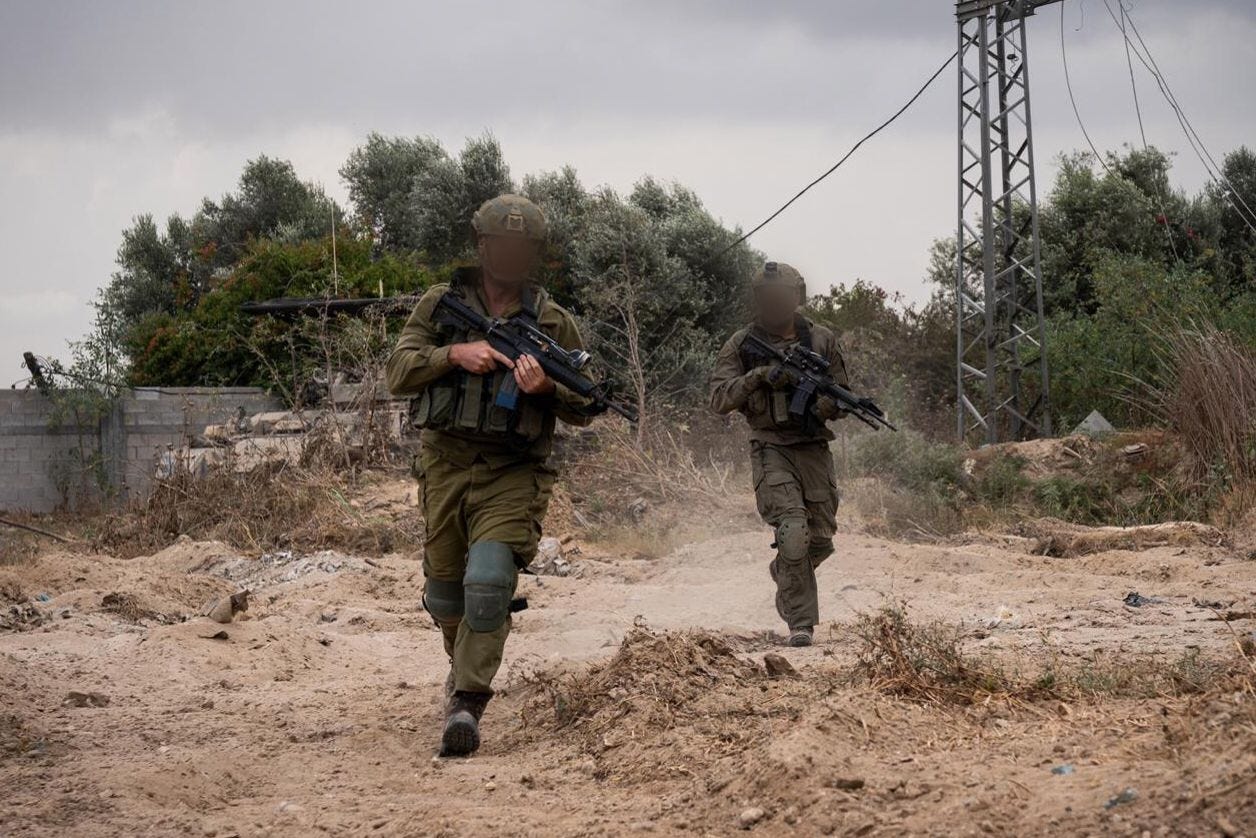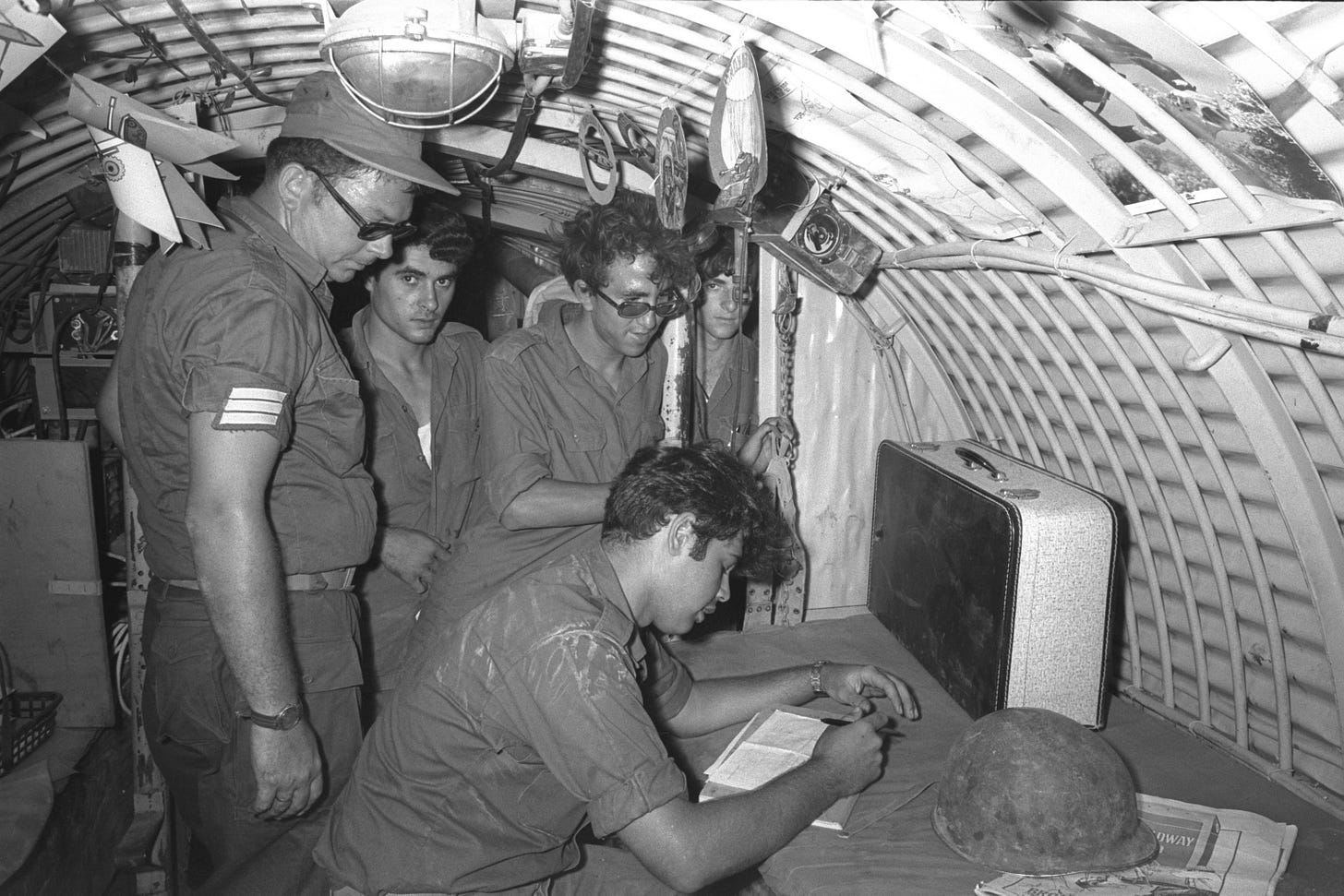DAY 232 OF THE WAR: Three More Hostage Bodies Retrieved, ICJ Decision on Rafah Leaves Israel Room to Manueuver, Heavy Fighting in Gaza, Incitement on Social Media
Tel Aviv Diary, May 25, 2024
Friday was another very difficult day in Israel. It started with the announcement that the IDF had retrieved the bodies of Orión Hernández Radoux (30), Hanan Yablonka (42), and Michel Nisenbaum (59). The Army believes that the three men were all killed in October by Hamas. Thanks to intelligence, the Army was able to find and return the bodies to Israel. Despite the families’ hopes that their loved ones were still alive, no signs of life had been confirmed since October 7th. Another deficit in a long list of failures is that families found out about the deaths and recovery of the bodies via the Internet and not directly from the Army.
The Army described the operation to retrieve the bodies as follows:
As part of the operations of Division 98 forces in the Jabaliya area, fighters from Battalion 75 eliminated a terrorist who was likely serving as a lookout for the area where the bodies were held. They raided the location and found the bodies' whereabouts. Shortly afterward, fighters from the Yahalom unit, the Shin Bet, and soldiers from a special unit in the Intelligence Directorate entered the area, located the three bodies, and retrieved them in a complex night operation.
The information regarding the location of the bodies was based on precise intelligence information received and analyzed over the past few days by the division's intelligence unit, the Shin Bet, and the Prisoners and Missing Persons headquarters in the Intelligence Directorate. The operations to retrieve the bodies are part of a planned and managed campaign both above and below ground led by Division 98 in Jabaliya.
The research and collection efforts were managed at the Hostage headquarters in the Intelligence Directorate in close cooperation with the Shin Bet and IDF units. The effort lasted several months and included intelligence gathering and analysis of intelligence indicators into a single picture. After the complex intelligence work, the headquarters maintained continuous and close communication with the maneuvering forces to guide them to the exact location identified by the intelligence and analysis.
RULING FROM THE HAGUE
In the afternoon on Friday, many Israelis were glued to their television screens, anticipating the decision of the ICJ. It was clear that the ICJ would issue some sort of order against Israel’s actions. The court did not grant Israel any delay to prepare for the hearing. Some in the government believed it would be best if the court would order a complete halt to the war, which Israel could then disregard and rely on the US to veto an attempt to enforce the decision by the UN Security Council. However, the ICJ did not rule that way. Instead, its primary ruling focused solely on Rafah.
The initial headlines stated the ICJ had ruled that Israel must stop its Rafah operation. However, a careful reading of the decision and the judge's opinions reveals that the court's ruling was not as definitive as first thought. The exact wording of the relevant clause calls on Israel to:
Immediately halt its military offensive and any other action in the Rafah Governorate which may inflict on the Palestinian group in Gaza conditions of life that could bring about its physical destruction in whole or in part.
The German Judge Nolte, who voted in favor of the decision, wrote the following:
… and the measure obliging Israel to halt the current military offensive in Rafah is conditioned by the need to prevent “conditions of life that could bring about the physical destruction in whole or in part” of the Palestinian group in Gaza. Thus, this measure does not concern other actions of Israel which do not give rise to such a risk.
Three other judges, including Israel’s Aaron Barak, agreed with the German understanding of the court’s decision. Notably, no judge issued a differing opinion. Based on current understanding, Israel’s Attorney General has informed the government that it can continue the operation, albeit with increased care. I hope the government will adopt a strategic approach—essentially, employing judo tactics with the goal of finding the path to use the decision to our advantage.
State we accept the ICJ decision and conduct ourselves strictly according to international law, ensuring that our actions do not lead to harm to Palestinians who are not affiliated with Hamas. If I were advising the government, I would also recommend taking positive, proactive steps to provide aid to Palestinian civilians, going beyond merely allowing truck deliveries to demonstrate that we take humanitarian concerns seriously.
The other aspects of the ICJ’s decision are not entirely unfavorable to Israel. While some headlines claim that the decision requires Israel to withdraw from the Rafah Crossing, the actual language of the decision states that Israel must: “Maintain open the Rafah Crossing for the unhindered provision at scale of urgently needed basic services and humanitarian assistance.”
As far as Israel is concerned, the Rafah Crossing is open; it is Egypt that is keeping it closed. The decision’s final clause reads:
Take effective measures to ensure the unimpeded access to the Gaza Strip of any commission of inquiry, fact-finding mission, or other investigative body mandated by competent organs of the United Nations to investigate allegations of genocide.
The above provision could obviously create complications in the future. However, the UN has not currently tasked any commission or group with investigating the situation in Gaza.
I was dismayed to see the Pavlovian reaction of many organizations, including the centrist American group, the Conference of Presidents of Major Jewish Organizations. They responded to the ICJ’s decision by stating, “The Conference of Presidents Condemns ICJ Decision Against Israel: This ruling is a victory for terrorists everywhere and represents an infringement on Israel's sovereignty and right of self-defense.”
Yes, the reality is that this case should never have been brought to the ICJ, and there is no evidence whatsoever that Israel is committing genocide. Moreover, what I wrote on Thursday holds true— the world often mistreats us. Still, we must accept that as a given and learn to respond more effectively rather than reflexively labeling every criticism as antisemitism.
COMBAT
Friday was a particularly violent day in both the North and the South. In the North, there were 11 separate rocket barrages in different areas of the region. Saturday was a bit quieter, with only five barrages. One of those barrages, including two anti-tank missiles fired at Metulah, caused extensive damage to homes, but since the town was empty of almost all its residents, there were no casualties.
Fighting in Gaza has been extremely intense during the last two days. Israel managed to kill Hamas’s Deputy Head of Internal Security in the Jabaliya area and the Division Commander in Rafah.
Here's the statement released by the Army Spokesman:
Division 98 forces continue to operate in the Jabaliya area in the northern Gaza Strip. In the past 24 hours, the forces have destroyed terror infrastructure, launch sites, and military buildings and discovered numerous weapons.
Additionally, the forces have killed dozens of terrorists in close combat and with the guidance of Air Force aircraft attacks, among them terrorists who directed attacks against the forces in the field.
In a closing loop by the forces, Air Force aircraft killed a Hamas sniper squad that had fired on IDF soldiers a few days earlier. There were no casualties among our forces in this encounter.
Combat team soldiers of Brigade 679 under Division 99 killed several terrorists in the past 24 hours in the central Gaza Strip during encounters and tank fire.
During the activities of Division 162 in the Rafah area, the soldiers killed a terrorist squad that opened fire on the force in close combat. The soldiers searched for weapons and Hamas terror infrastructure in the area. As part of the searches, they located and destroyed shafts and terror infrastructure, along with numerous weapons, including combat equipment, weapons, and booby-trapped explosives.
HOSTAGES
A meeting was held in Paris between the head of the Mossad, the Prime Minister of Qatar, and the head of the CIA. Following the encounter, it was reported that constructive progress had been made. Negotiations are expected to resume this week, although no one is optimistic.
INCITEMENT ON SOCIAL MEDIA
Today, two videos circulating on the internet sparked tremendous uproar. One featured a masked man who claimed to be an IDF reservist and called for a revolt against the IDF Chief of Staff and the Minister of Defense. In the clip, the masked man declared his allegiance to only one leader, Netanyahu.
The second video was posted by someone threatening to kill all those protesting on Kaplan Street—including their children. He continued asserting he would take the most left-leaning individuals to a guillotine.
Yair Netanyahu and Yinon Magal, a leading spokesman of Israel’s rightwing posted the first video. Netanyahu gave a very mild condemnation of the video, basically equating it with grievances expressed by the pilots and others protesting the judicial overhaul. Former Defense Minister Gantz demanded that Netanyahu issue a strong condemnation. Tonight, it was confirmed that the IDF reservist in the video has been identified and will be brought in for questioning.
DEMONSTRATIONS IN TEL AVIV
Tonight, once again, there was a rally to support the families of the hostages, as well as a demonstration calling for a new election. Both were attended by tens of thousands.
CAFE´ HA’OTEF
On Friday, I had the pleasure of visiting a very special café — Café Ha’Otef. This café was established by residents from Netiv HaAsarah, located along the Gaza border. The café is currently located in Sarona, with an entrance from Kaplan Street. Aside from helping those who are displaced, they serve excellent coffee. I highly recommend visiting if you're in the area.
–––––∞–––––∞–––––∞–––––∞–––––∞–––––∞–––––∞–––––
A PIECE OF HISTORY
The Events that Preceded the Yom Kippur War
Anwar Sadat assumed power in Egypt in 1970 and made it clear he was resolved to retrieve the Sinai Peninsula from Israel. In June 1973, during a late-night meeting with President Nixon, Soviet leader Brezhnev issued a warning: If Israel did not accept Egypt’s proposal to withdraw from Sinai in exchange for a non-belligerency treaty, there would be a war.
In the subsequent months, there were growing indications of the possibility of war, yet the Israeli army remained unconcerned. Convinced of its own superiority, it did not believe that Egypt or Syria would initiate a war. General Eli Zeira, Israel’s Chief of Intelligence, was a leading advocate of this view. Zeira championed the view that the Arabs would not wage war against Israel until they had achieved strategic parity, which they had not. By September 1973, there were clear signs the Egyptians and Syrians were preparing for something significant. Despite the signs of a buildup, the Army remained confident that war was unlikely.
On the evening of September 24, 1973, King Hussein of Jordan made a covert visit to meet Prime Minister Golda Meir. At the meeting, he warned that Egypt and Syria were planning a joint attack. Despite the warning, the Army, led by the intelligence division, continued to believe the chance of war was low. This belief persisted despite a massive buildup of forces by both Egypt and Syria, which army intelligence interpreted as merely preparatory drills. On the northern front, the Syrian army was making all the preparations necessary for a war, and the commanders were nervous. Nonetheless, they remained skeptical that Syria would attack alone and were partially reassured by assessments suggesting that Egypt would not initiate an attack.
As increasing reports began arriving that confirmed the possibility of an attack, the army started to rethink its initial analysis. On Friday, October 5, the eve of Yom Kippur, a special cabinet meeting was convened to discuss the possibility of war. Despite mounting evidence that war was likely, Zeira held firm that a war would not take place. IDF Chief of Staff Elazar responded by raising the army's alert status to one level below full war readiness. That same night, the head of the Mossad met with the agency's most reliable source in Egypt, who explicitly warned him that war would erupt the following day. By the early morning hours, the army had received confirmation that war would indeed commence the next day.
On the west bank of the Suez Canal, Egypt had amassed five divisions, 100,000 soldiers, 1,350 tanks, and 2,000 artillery pieces. In contrast, the Israeli defense along a hundred-mile stretch comprised only 450 men. Across all of Sinai, Israel had 290 tanks and 44 artillery pieces. The situation was even more dire on the Golan Heights, facing the Syrians.
Within a few hours, the Yom Kippur war would begin.









Re: the Yom Kippur war.
There were three Gorodish brothers who were all senior officers in the IDF. We would call them the Yok (Yoel), the Bok (Baruch) and the Shmock. (Shmuel). It was my luck to serve in Yoel's brigade, the 274th Armored. On the 21st of October, shortly before the ceasefire, you'll gave the order to assault an Egyptian position called Hamutal. Israeli intelligence had concluded that this sand dune was lightly held, so, the task was given to two companies of mechanized infantry supported by tanks. These were reservists and back in the day everybody knew who ended up in mechanized infantry...not the brightest and not the most highly motivated shall we say. Plus these guys were older, mostly family men with little to gain and a lot to lose. Needless to say, another intelligence failure, as Hamutal was actually held by a large Egyptian force dug in with sagger missiles and supported by tanks emplaced on the adjoining dune. The assault was a disaster with many casualties on our side.
After the ceasefire I had the joy of living in a foxhole on another sand dune facing the 2nd Army. For the next 6 months I had plenty of time, in between shellings, to ponder the nature of Israeli society, the hubris after the six day war and the awful depression following Yom Kippur. I reached the conclusion that Israeli society was manic-depressive, driven by deep seated fear of annihilation and I wanted no more part in it. I left, only to return a few years ago, mostly out of curiosity and a little homesickness.
Israel's response to October 7 leads me to believe that nothing has changed, fundamentally, confirming my diagnosis.
Great report Marc!